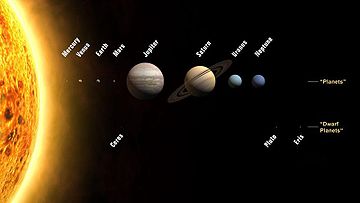Portal:Systems science
The systems science portal
 |
Complex systems approach
|
Systems science is an transdisciplinary[1] field that studies the nature of systems—from simple to complex—in nature, society, cognition, engineering, technology and science itself. To systems scientists, the world can be understood as a system of systems. The field aims to develop interdisciplinary foundations that are applicable in a variety of areas, such as psychology, biology, medicine, communication, business management, engineering, and social sciences.
Systems science covers
Selected article -
An operating system (OS) is system software that manages computer hardware and software resources, and provides common services for computer programs.
Selected picture

Planets and dwarf planets of the Solar System; while the sizes are to scale, the relative distances from the Sun are not.
'WikiProjects
Selected biography -
Wiener is considered the originator of cybernetics, the science of communication as it relates to living things and machines,
with implications for engineering, systems control, computer science, biology, neuroscience, philosophy, and the organization of society. His work heavily influenced computer pioneer John von Neumann, information theorist Claude Shannon, anthropologists Margaret Mead and Gregory Bateson, and others. (Full article...)After much consideration, we have come to the conclusion that all the existing terminology has too heavy a bias to one side or another to serve the future development of the field as well as it should; and as happens so often to scientists, we have been forced to coin at least one artificial neo-Greek expression to fill the gap. We have decided to call the entire field of control and communication theory, whether in the machine or in the animal, by the name Cybernetics, which we form from the Greek κυβερνήτης or steersman.
Did you know
- ... that the American neurophysiologist neurobiology?
- ... * continuing vertically with a science of design,
- ... * and next a science of action, called "Interactive management".
- ... that self-organization is a process of attraction and repulsion in which the internal organization of a system, normally an open system, increases in complexity without being guided or managed by an outside source?
Categories
Related portals
Topics
Tasks
 |
Here are some tasks awaiting attention:
|














